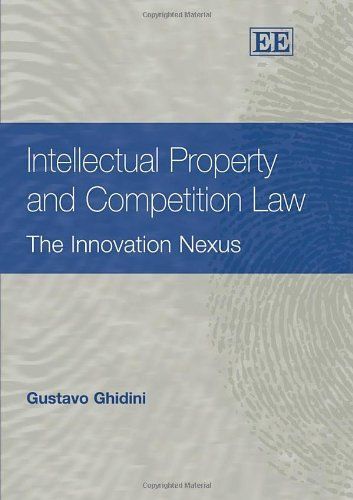
Intellectual Property and Competition Law The Innovation Nexus
The book ends with a comprehensive selection of the relevant bibliography. This part is all the more valuable to the reader as Ghidini does not simply list the relevant literature but puts it in it general context and comments on it. Ghidini s book is a fascinating trip through the system of IP laws. Beatriz Conde Gallego, Intellectual Property and Competition Law Intellectual Property and Competition Law by Gustavo Ghidini provides a persuasively presented descriptive analysis of a distinctively European perspective on intellectual property law and its relationship to competition law. Professor Ghidini expertly presents the evolution of intellectual property laws and its contemporary manifestations with respect to the expansion copyright law in technological fields and the inevitability conflict with patent law, the attempt at creating monopolies (such as in biotechnology), and so much more. A seminal work of impressive and articulate scholarship, Intellectual Property and Competition Law should be considered mandatory reading for students and researchers in the field of intellectual property rights and a very strongly recommended addition to academic library International Economics and Judicial Studies reference collections. The Economics Shelf, Midwest Book Review . . . the provocative nature of this book is one of its great strengths, as are its cohesiveness and erudition. Mel Marquis, European Competition Law Review We in the United States have much to learn not only from Gustavo Ghidini s careful analysis of modern trends in the European IP regime but also from his thoughtful development of the thesis that free competition should be understood as the overarching principle guiding both IP protection and what we call antitrust law. Rudolph J.R. Peritz, New York Law School, author of Competition Policy in America and American Antitrust Institute, US This rich and challenging book offers a critical appraisal of the relationship between intellectual property law and competition law, from a particularly European perspective. Gustavo Ghidini highlights the deficiencies in studying each of these areas of law independently and argues for a more holistic approach, insisting that it is more useful, and indeed essential, to consider them as interdependent. He does this first by examining how competition and intellectual property (IP) converge, diverge, and inform one another. Secondly, he assesses how IP law can be interpreted through the guiding principles of competition law antitrust and unfair competition and within the overarching principle of free competition. The book traces the evolution of modern IP law, which it claims is marked heavily both by over-protectionist trends such as the extension of copyright law to technological fields, where it trespasses on the territory of patent law and by attempts to monopolize the achievements of basic research, such as in the example of biotechnology. Through an examination of such emerging issues as access to standards of information and patenting of genetic materials, the author makes a clear case for a reading of IP law that promotes dynamic processes of innovation by competition , and competition by innovation , with related benefits to consumer welfare such as wider choices, greater access to culture and information, and lower prices. Advanced students and researchers in all areas of intellectual property will find this book a stimulating alternative to traditional interpretations of the subject.